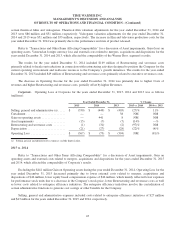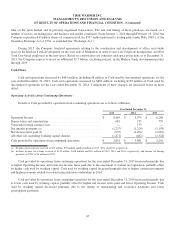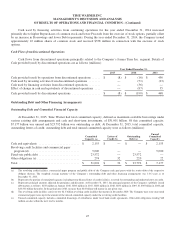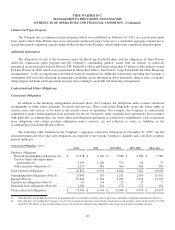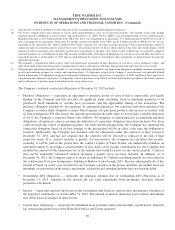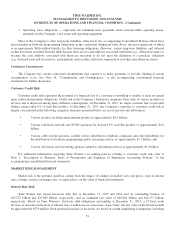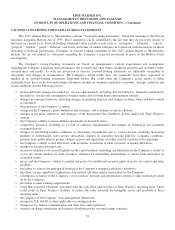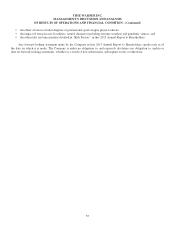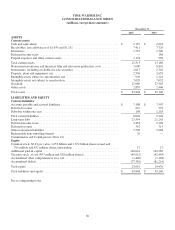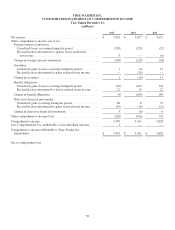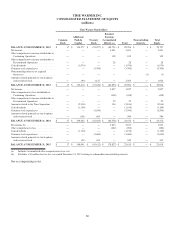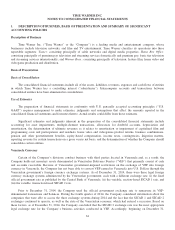Time Magazine 2015 Annual Report Download - page 67
Download and view the complete annual report
Please find page 67 of the 2015 Time Magazine annual report below. You can navigate through the pages in the report by either clicking on the pages listed below, or by using the keyword search tool below to find specific information within the annual report.TIME WARNER INC.
MANAGEMENT’S DISCUSSION AND ANALYSIS
OF RESULTS OF OPERATIONS AND FINANCIAL CONDITION - (Continued)
Equity Risk
The Company is exposed to market risk as it relates to changes in the market value of its investments. The Company
invests in equity instruments of public and private companies for operational and strategic business purposes. These
securities are subject to significant fluctuations in fair market value due to the volatility of the stock markets and the
industries in which the companies operate. At December 31, 2015 and 2014, these securities, which are classified in
Investments, including available-for-sale securities in the accompanying Consolidated Balance Sheet, included $1.363 billion
and $898 million, respectively, of investments accounted for using the equity method of accounting, $160 million and $263
million, respectively, of cost-method investments, $562 million and $605 million, respectively, of investments related to the
Company’s deferred compensation program, $85 million and $79 million, respectively, of investments in available-for-sale
securities and $179 million and $242 million, respectively, of investments in warrants to purchase common stock of CME.
The potential loss in fair value resulting from a 10% adverse change in the prices of the Company’s equity-method
investments, cost-method investments, available-for-sale securities and investments in warrants would be approximately
$180 million. The potential loss in fair value resulting from a 10% adverse change in the prices of certain of the Company’s
deferred compensation investments accounted for as trading securities would be approximately $20 million. While Time
Warner has recognized all declines that are believed to be other-than-temporary, it is reasonably possible that individual
investments in the Company’s portfolio may experience an other-than-temporary decline in value in the future if the
underlying investee company experiences poor operating results or the U.S. or certain foreign equity markets experience
declines in value.
CRITICAL ACCOUNTING POLICIES
The Company’s consolidated financial statements are prepared in accordance with U.S. GAAP, which requires
management to make estimates, judgments and assumptions that affect the amounts reported in the consolidated financial
statements and accompanying notes. Management considers an accounting policy to be critical if it is important to the
Company’s financial condition and results of operations and if it requires significant judgment and estimates on the part of
management in its application. The development and selection of these critical accounting policies have been determined by
the management of Time Warner, and the related disclosures have been reviewed with the Audit and Finance Committee of
the Board of Directors of the Company. The Company considers policies relating to the following matters to be critical
accounting policies:
• Impairment of Goodwill and Intangible Assets;
• Film and Television Production Cost Recognition, Participations and Residuals and Impairments;
• Licensed Programming Inventory Cost Recognition and Impairment;
• Gross versus Net Revenue Recognition;
• Sales Returns and Pricing Rebates; and
• Income Taxes.
For a discussion of each of the Company’s critical accounting policies, including information and analysis of estimates
and assumptions involved in their application, and other significant accounting policies, see Note 1, “Description of
Business, Basis of Presentation and Summary of Significant Accounting Policies,” to the accompanying consolidated
financial statements.
53


